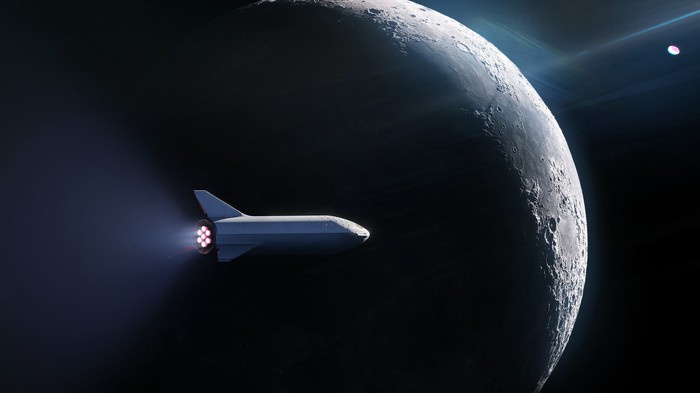Elon Musk would soon be able to offer space tourism flights for a fraction of the cost of Virgin Galactic, but that’s not yet the case.
It’s official: Virgin Galactic ( SPCE -6.23% ) is getting out of the space tourism business, at least for the time being.
On Saturday, June 8, Virgin Galactic’s “Galactic 07” mission took off without incident, briefly visited space, and safely landed all passengers aboard. It was the company’s seventh revenue-generating commercial flight. Virgin is currently retiring its only operational “Unity” spaceplane, which it will suspend operations while it builds two new “Delta” spaceplanes to replace it.
As a result, not a single Virgin spaceplane will be able to approach space for the next two years in a row.
Upcoming competitors
This is undoubtedly good news for one of Virgin Galactic’s rivals, Jeff Bezos’ Blue Origin, which resumed its own space tourism flights last month, and Unity’s early retirement means that Blue Origin can expand its space tourism business for a second consecutive year without worrying about competition from Virgin Galactic.
But the second competitor may not be so lucky.
Over the past decade, Elon Musk’s SpaceX has built its business on the model of building better, more cost-effective rockets and spacecraft and undercutting their rivals in order to take market share from them. Musk has already done this with satellite launches, lunar landers, and satellite internet.
Until last week, it seemed like he might do the same with space tourism.
Introducing Starship: SpaceX’s space tour bus
SpaceX conducted the fourth test flight of its Super Heavy booster and Starship spacecraft last week, and it was mostly successful. The giant two-part rocket still has some kinks to work out, and SpaceX plans to do multiple test flights before carrying cargo, or even humans, into space, but Starship ultimately seems likely to pose a formidable threat to both Virgin Galactic and Blue Origin.
That’s because Musk designed Starship primarily as a large-scale vehicle for colonists to Mars. To that end, it’s been built large enough to carry as many as 100 passengers at a time. What’s more, it’s designed as a reusable rocket ship, costing just $10 million per launch.
It doesn’t take a PhD to do the math: if you divide $10 million by 100, the ticket price for a passenger on SpaceX’s space tour bus could fall to $100,000 — less than half of what Virgin Galactic originally charged customers, and less than 25% of what Virgin is currently charging.
And for more amazing space tours.
Unlike Virgin Galactic’s Unity (or Delta) spaceplane and Blue Origin’s New Shepard rocket ship, Starship is an orbital-class vehicle, which means it can take tourists on much longer journeys, such as orbiting Earth for days or traveling to the Moon and back. In contrast, Virgin Galactic and Blue Origin’s suborbital spacecraft can only provide a few minutes of weightlessness at the edge of space before landing on Earth.
SpaceX Joy
Given the risks, Virgin Galactic investors might be feeling a bit pleased about the SpaceX news this month.
Five years ago, SpaceX hit its space tourism big time when Japanese billionaire Yusaku Maezawa agreed to pay an undisclosed amount to rent an entire SpaceX “Starship” spacecraft, aiming to become the first private astronaut to fly the new craft on a six-day “Dear Moon” round-trip trip to the moon. At the time, Starship wasn’t yet ready to fly, but SpaceX told Maezawa (and his eight passengers) to schedule a launch in 2023.
However, in a June 1 post on Twitter, Maezawa announced that he was canceling the trip and his contract with SpaceX.
We are unable to make future plans in this situation and would be remiss to keep our crew waiting for too long, so we have made the difficult decision to cancel at this time.
We apologize to everyone who was looking forward to this project.
— Yusaku Maezawa (MZ) (@yousuckMZ) June 1, 2024
Maezawa cited delays in the flight schedule (they were supposed to leave last year after all) as the reason, but some of his crew members said they would have been happy to wait any length of time until the Starship was ready. Other commenters suggested Maezawa’s decline in net worth, from $3 billion in 2018 to $1.4 billion today, may have had something to do with his decision to pull out.
What it means for investors
SpaceX must be disappointed by this. Investors are disappointed too. They will miss their first opportunity to know how much SpaceX will charge for a trip to space on Starship, and to compare its ticket prices to those of Virgin Galactic and Blue Origin. That would give us a better idea of not only how much Virgin and Blue Origin’s prices will ultimately fall, but also what a future SpaceX IPO might be worth.
But if there’s any consolation, it’s that at least Virgin Galactic investors know they have a few more years before they have to worry about SpaceX taking over the industry that Virgin Galactic built. In that respect, they can breathe a small sigh of relief.

